
Cynthia Ann McKinney is a former American politician. As a member of the Democratic Party, she served six terms in the United States House of Representatives. She was the first African American woman elected to represent Georgia in the House. She left the Democratic Party and ran in 2008 as the presidential nominee of the Green Party. She ran for vice president in 2020 after the Green Party of Alaska formally nominated her and draft-nominated Jesse Ventura for president.
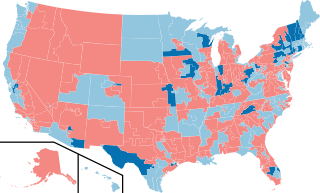
The 2006 United States House of Representatives elections were held on November 7, 2006, to elect members to the United States House of Representatives. It took place in the middle of President George W. Bush's second term in office. All 435 seats of the House were up for election. Those elected served in the 110th United States Congress from January 3, 2007, until January 3, 2009. The incumbent majority party, the Republicans, had won majorities in the House consecutively since 1994, and were defeated by the Democrats who won a majority in the chamber, ending 12 years of Republican control in the House.

Henry Calvin Johnson Jr. is an American lawyer and politician serving as the U.S. representative for Georgia's 4th congressional district since 2007. He is a member of the Democratic Party. The district is anchored in Atlanta's inner eastern suburbs, including Decatur, all of Rockdale County, Lithonia, Stone Mountain, Covington and a sliver of Atlanta itself. Johnson is one of only three Buddhists to have served in the United States Congress. The others are Senator Mazie Hirono and former Representative Colleen Hanabusa, both of Hawaii.
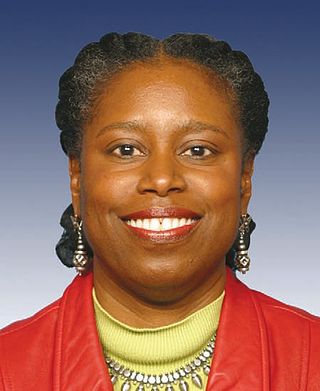
Electoral history of Cynthia McKinney, Democratic Representative from Georgia 11th and 4th congressional district, and 2008 Green Party Presidential nominee.

Elections were held on November 2, 2010, to determine North Carolina's 13 members of the United States House of Representatives. Representatives were elected for two-year-terms to serve in the 112th United States Congress from January 3, 2011, until January 3, 2013. Primary elections were held on May 4, 2010, and primary runoff elections were held on June 22, 2010.

Elections were held on November 2, 2010, to determine Illinois's 19 members of the United States House of Representatives. Representatives were elected for two-year terms to serve in the 112th United States Congress from January 3, 2011, until January 3, 2013. Primary elections were held on February 2, 2010.

Elections were held on November 2, 2010, to determine Georgia's 13 members of the United States House of Representatives. Representatives were elected for two-year terms to serve in the 112th United States Congress from January 3, 2011, until January 3, 2013. Primary elections were held on July 20, 2010, and primary runoff elections were held on August 10, 2010.

Elections were held on November 2, 2010, to determine Maine's two members of the United States House of Representatives. Representatives were elected for two-year terms to serve in the 112th Congress from January 3, 2011, until January 3, 2013. Primary elections were held on June 8, 2010.

Elections were held on November 2, 2010, to determine Utah's three members of the United States House of Representatives. Representatives were elected for two-year terms to serve in the 112th United States Congress from January 3, 2011, until January 3, 2013. Primary elections were held on June 22, 2010.

Elections were held on November 2, 2010, to determine Mississippi's four members of the United States House of Representatives. Representatives were elected for two-year terms to serve in the 112th United States Congress from January 3, 2011, until January 3, 2013. Primary elections were held on June 1, 2010, and primary runoff elections on June 22.

Elections were held on November 2, 2010, to determine Louisiana's seven members of the United States House of Representatives. Representatives were elected for two-year terms to serve in the 112th United States Congress from January 3, 2011, until January 3, 2013. Primary elections were held on August 28, 2010, and a runoff election for the Republican Party nomination in the 3rd district took place on October 2, 2010.
Keisha Sean Waites is an American politician from the state of Georgia. A Democrat, she served in the Georgia House of Representatives from 2012 to 2017, representing southeast Atlanta, College Park, East Point, Hapeville, Forest Park, Hartsfield Jackson Airport, Porsche Headquarters and parts of Clayton and DeKalb counties.
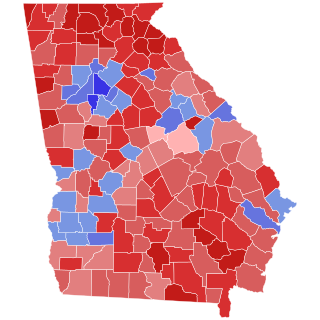
The 2020–21 United States Senate election in Georgia was held on November 3, 2020, and on January 5, 2021, to elect the Class II member of the United States Senate to represent the State of Georgia. Democrat Jon Ossoff defeated incumbent Republican Senator David Perdue in the runoff election. The general election was held concurrently with the 2020 presidential election, as well as with other elections to the Senate, elections to the U.S. House of Representatives and various state and local elections.
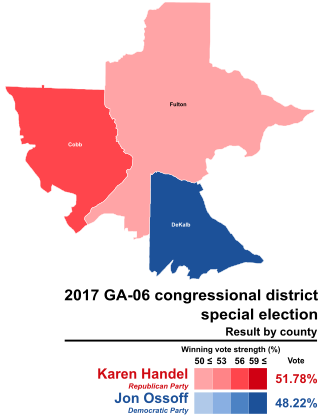
A special election to determine the member of the United States House of Representatives for Georgia's 6th congressional district was held on April 18, 2017, with a runoff held two months later on June 20. Republican Karen Handel narrowly defeated Democrat Jon Ossoff in the runoff vote, 51.8% to 48.2%. Handel succeeded Tom Price, who resigned from the seat following his confirmation as United States Secretary of Health and Human Services in the Trump administration. The runoff election was necessary when no individual candidate earned the majority of votes in the election on April 18. Ossoff received 48.1% of the vote in the first round, followed by Handel with 19.8%.

Thomas Jonathan Ossoff is an American politician serving as the senior United States senator from Georgia since 2021. A member of the Democratic Party, Ossoff was previously a documentary filmmaker and investigative journalist.
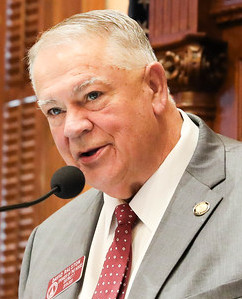
The 2018 Georgia House of Representatives elections took place as part of the biennial United States elections. Georgia voters elected state representatives in all 180 of the state house's districts. State representatives serve two-year terms in the Georgia House of Representatives.

The 2022 United States Senate election in Georgia was held on November 8, 2022, to elect a member of the U.S. Senate to represent the state of Georgia. Incumbent Democratic senator Raphael Warnock won his first full term in office, defeating Republican former football player Herschel Walker. Under Georgia's two-round system, Warnock was re-elected in a runoff election on December 6 after neither candidate received over 50% of the vote on November 8. Warnock's win was the only statewide victory for Democrats in Georgia in 2022.

The 2020–21 United States Senate special election in Georgia was held on November 3, 2020, and on January 5, 2021, to elect the Class III member of the United States Senate to represent the State of Georgia. Democrat Raphael Warnock defeated appointed incumbent Republican Kelly Loeffler. The first round of the election was held on November 3, 2020; however, no candidate received a majority of the vote, so the top two candidates—Warnock and Loeffler—advanced to a runoff on January 5, 2021, which Warnock won narrowly.

Several elections took place in the U.S. state of Georgia in 2022. The general election was held on November 8, 2022. A runoff election for one of Georgia's seats in the United States Senate was held on December 6, 2022. The runoff was scheduled because none of the candidates for Senate received 50% of the statewide vote in the general election. In addition to the Senate seat, all of Georgia's seats in the United States House of Representatives were up for election. Also up for election were all of Georgia's executive officers and legislative seats, as well as one seat on the Georgia Public Service Commission. The Republican Party decisively won every single statewide office in Georgia except for the Federal Senate race which narrowly went Democratic in 2022.

The 2022 Georgia lieutenant gubernatorial election was held on November 8, 2022, to elect the lieutenant governor of the U.S. state of Georgia. It coincided with various other statewide elections, including for U.S. Senate, U.S. House, and Governor of Georgia. Georgia is one of 21 states that elects its lieutenant governor separately from its governor.





















